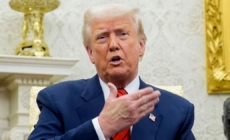-
Venetians protest Amazon founder’s grandiose wedding plan - 11 mins ago
-
US Deploys Aircraft Carrier USS Nimitz Over Iran-Israel Conflict - 26 mins ago
-
The Trump Organization is debuting a cellular phone service called T1 Mobile at $47.45 a month - 28 mins ago
-
Triple Victory for “The Riddle Pact” at Vegas Movie Awards - 31 mins ago
-
UFL Top 10 Plays from UFL Championship | United Football League - 35 mins ago
-
COVID ‘razor blade throat’ rises as new subvariant spreads in California - 58 mins ago
-
Israeli fire kills 23 people in Gaza, many at aid site, medics say - 60 mins ago
-
Beach Favorite Lángos Now Costs as Much as a Meal at Lake Balaton - about 1 hour ago
-
MLB News: Don Mattingly Slams Door on Return to Managing - about 1 hour ago
-
Kyle Kirkwood and more post-race interviews from Bommarito Automotive Group 500 | INDYCAR on FOX - about 1 hour ago
FM: Strengthening V4 cooperation is at the heart of Hungary’s foreign policy strategy
Minister Szijjártó said that the recent period had “not been easy” when it came to bolstering V4 cooperation.
Péter Szijjártó, Minister of Foreign Affairs and Trade, said that strengthening the Visegrad Group cooperation has always been at the heart of Hungary’s foreign policy strategy.
Speaking in Bratislava on Tuesday, the foreign minister said there was hope for restoring V4 cooperation, as all countries lost out if the partnership became difficult.
During his speech at the closing conference of the V4 Business Forum, Minister Szijjártó said that the recent period had “not been easy” when it came to bolstering V4 cooperation.
Minister Szijjártó said the main reason for this was not disagreements among the governments of Czechia, Hungary, Poland and Slovakia, arguing that the grouping’s biggest success of getting the European Union to scrap migrant quotas had come at a time when the V4 countries’ prime ministers had all belonged to different political families.
Minister Szijjártó said the real reason why cooperation had become more difficult was that certain political leaders had “broken with the past practice” of respecting each other’s differences and instead focusing on areas that offer mutual benefits.
He said the difficulties in V4 cooperation had led to the grouping losing out on many opportunities and growth potential. “And I think this doesn’t just go against our national interests, but also those of the V4 countries,” he added.
Minister Szijjártó thanked those who had kept the alliance alive despite the political difficulties, including the business players “who have represented common sense and rationality”.
He said the stronger the V4 was the better it was for everyone, noting that for the first time last year, Czechia, Poland and Slovakia were all among Hungary’s top five trading partners.
The minister said that though the last several years had been “all about crises”, central Europe had emerged stronger from them.
“The stronger and closer our cooperation, and the less we ideologise and politicise economic ties, the greater chance we have to be among the strongest players of the next world political and economic era,” he added.
He said the V4’s combined annual GDP of 500 billion dollars would put the grouping in 16th place in a global ranking. “This means that if we were a single country, we’d be a member of the G20,” he added.
Meanwhile, he said only Germany’s annual trade turnover exceeded the V4’s 1,600 US dollars in the EU, adding that trade between Germany and the V4 was double the trade volume between Germany and France.
Minister Szijjártó said he was hopeful about the future of the V4, particularly in light of Poland’s recent presidential election and projections for Czechia’s upcoming elections.
Source link































